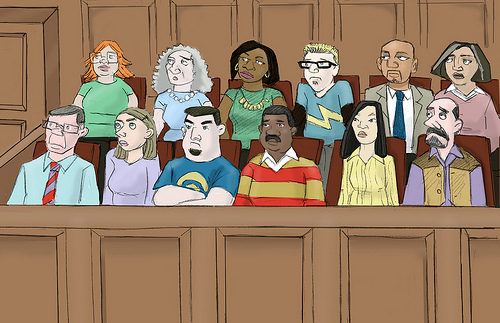You see your case through rose-colored lenses and overlook the warts. But jurors won’t be nearly as kind and on the day of the verdict, you’re stunned by the jurors’ arbitrary and whimsical views. You’re shocked that the jurors’ view of the evidence is completely different from your own and you’re tempted to write off the defense verdict as the result of a crazy and irrational jury.
Here’s the problem: you perceive the evidence as a plaintiff’s lawyer advocating for an injury victim, but jurors perceive the case from a different perspective. The average juror has no medical or legal background, little education and while they’ve answered the subpoena for jury duty, they’re anxious to go home. You have two choices: deal with this harsh reality or suffer a defense verdict.
It doesn’t have to be this way. A focus group provides invaluable insights into the weaknesses of your case, questions that must be answered and problems with trial exhibits. Based upon the feedback from the focus group, you form a new trial strategy, tackle the weaknesses head-on and answer the questions that jurors will be asking in the jury deliberation room. For $500, there is no better investment for a trial lawyer.
How Focus Groups Change Everything
Just weeks before a recent trial, I was supremely confident in a medical malpractice case alleging a delay in the diagnosis of pancreatic cancer. Our medical experts could not have been stronger in their opinions. I was feeling great about our client’s chances…until the focus groups began.
At the first focus group, the “jurors” pointed out holes that I never expected. The jurors in the focus group almost unanimously agreed that the plaintiff was at fault for failing to follow medical instructions, despite the overwhelmingly evidence that the defendant/doctor did not order the appropriate test. We could see for the first time that our client’s failure to follow medical advice was legitimate and would almost certainly result in a defense verdict.
At the second focus group, we presented evidence of the doctor’s responsibilities when faced with a patient who is not following their instructions. We showed that the doctor did not follow her protocols for non-compliant patients and made the case that the violation of the protocols places at least some responsibility on the doctor. Again, the jurors in the focus group disagreed.
Make No Excuses for Your Weaknesses
We knew we had a serious, potentially fatal problem. Rather than denying or ignoring the weakness, we formed a plan to make no excuses during jury selection.
“My friend, Jason, is not perfect. You will hear from the defense that they have excuses for not getting the test done and we want to be fair, some of the defendant’s excuses are legitimate.
Jason has no excuses. Jason should have followed the doctor’s advice and I’m sure he wishes he had done things differently.
Is there any other information that you’d like to know? If you’ve made up your mind, that’s okay, just tell us.”
Safe to say that the defense lawyer has never heard a plaintiff’s lawyer admit that the plaintiff made mistakes and has no excuses for them. The plaintiff’s mea culpa defuses the weakness and puts the focus back on the doctor’s responsibility for not following her protocols.
Problem solved? We’ll never know because the case settled on the first day of trial. But we never would have realized the serious weaknesses facing our client unless we conducted focus groups. The feedback from the focus groups changed our strategy for jury selection and opening statement and our preparation of the lay and expert witnesses.
How to Do Your Own Focus Group
Scheduling a focus group is not hard. Have your secretary call the local high school or civic organization (i.e., fire department or humane society) and tell them that you need at least 20 persons to attend a “Jury Research Project” for two hours on a weekday night. Explain that you will provide a free pizza dinner and $500 donation, and let the organization provide the jurors and office space.
Bring another lawyer to present the opposing side of the case and have the jurors critique your trial exhibits. At the end of the presentation of proof, split the jurors into three juries and ask them to reach a unanimous verdict on the ultimate issue of negligence and/or causation. Watch the jury deliberations (or even video them) and you just might be shocked and a bit disgusted and just maybe change the way you prepare for your next trial.
For the questionnaires and confidentiality forms that you will need for a focus groups, I recommend these excellent books, “How to Do Your Own Focus Groups: A Guide for Trial Attorneys”, by jury consultant, David Ball, and “Focus Groups: Hitting the Bull’s-Eye”, by Phillip Miller, Esq. and Paul Scoptur, Esq.
